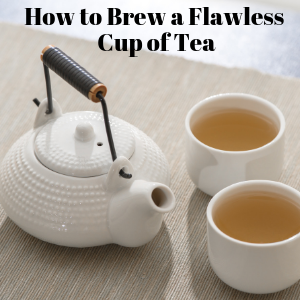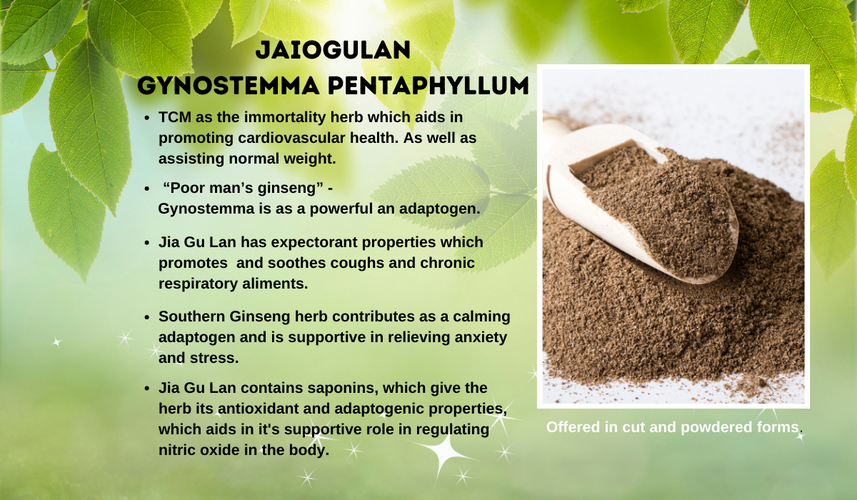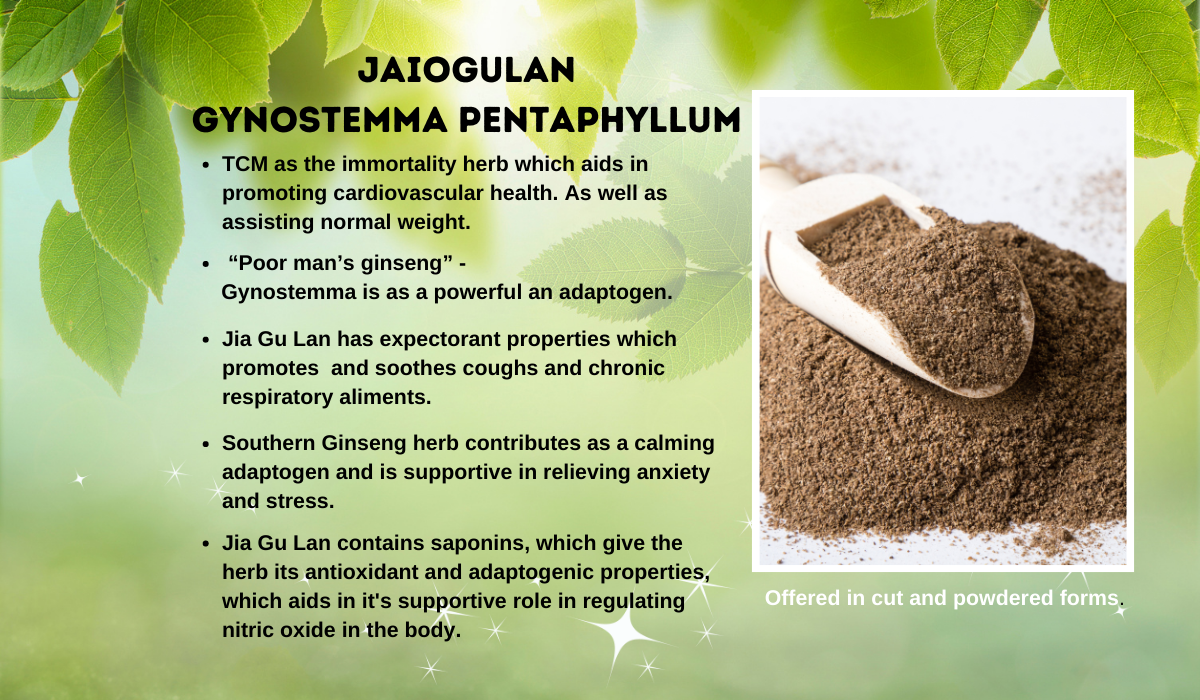Jiaogulan (Gynostemma pentaphyllum): The Ultimate Guide to the “Immortality Herb
Posted by Sarah Aries, MS, Holistic Herbalist on Aug 25th 2025
Jiaogulan (Gynostemma pentaphyllum): The Ultimate Evidence-Based Guide to the “Immortality Herb”
Jiaogulan (Gynostemma pentaphyllum) is an adaptogenic climbing vine
known as the “Immortality Herb” for its role in longevity, heart health,
and energy support, with modern research confirming antioxidant, metabolic,
and stress-resilience benefits.
Welcome to the transformative world of Jiao Gu Lan, also known as Gynostemma pentaphyllum, a powerful herbal gem celebrated in Traditional Chinese Medicine for its remarkable health benefits. Revered for centuries, this adaptogenic herb is prized not only for its ability to enhance energy and vitality but also for its profound impact on overall wellness. Often referred to as "Southern Ginseng," Jiao Gu Lan is renowned for its adaptogenic properties, helping your body adapt to stress while promoting balance and harmony.
Quick Facts About Jiao Gu Lan
-
Origin: Southern China, Vietnam, Korea
-
Active Compounds: Gypenosides (saponins), flavonoids, polysaccharides
-
Primary Benefits: Heart & metabolic health, stress resilience, antioxidant protection
-
Traditional Use: TCM to tonify qi, protect liver, and promote longevity
-
Modern Research: Supports cholesterol balance, blood sugar control, antioxidant activity, and shows anti-cancer potential
-
Best Forms: Organic tea, standardized extracts, GMP-certified supplements
-
Jiaogulan is pronounced as: "JOW-goo-lahn"
What Is Jiaogulan?
Jiaogulan (Gynostemma pentaphyllum) is a perennial climbing vine native to China and other parts of Asia. It belongs to the cucumber family (Cucurbitaceae) and is known for its sweet-tasting leaves.
Yes—jiaogulan (Gynostemma pentaphyllum) belongs to the Cucurbitaceae family, a.k.a. the cucumber/gourd family (same family as cucumbers, melons, and squash).
Quick taxonomy:
-
Order: Cucurbitales
-
Family: Cucurbitaceae
-
Genus: Gynostemma
-
Species: G. pentaphyllum
Helpful note: despite the nickname “southern ginseng,” it’s not related to true ginseng (Panax, family Araliaceae).
-
Nickname: “Southern Ginseng” or “Immortality Herb” due to its traditional association with longevity and vitality.
-
Modern Interest: Today, Jiaogulan is valued as an adaptogenic herb that helps the body adapt to occasional stress and supports overall well-being.
Traditional Use & Cultural Significance
In Traditional Chinese Herbal Practice:
-
Tonifying Qi: Historically used to help restore internal balance and promote energy.
-
Longevity Herb: Villages in Guizhou, China, became known for high life expectancy, with residents regularly drinking Jiaogulan tea.
-
Versatile Herb: Enjoyed as a daily tonic to support general health rather than targeting specific conditions.
Key Compounds & Why They Matter
Jiaogulan’s reputation as the “Immortality Herb” comes from its unique combination of naturally active compounds. These plant nutrients work together to support your body’s energy, balance, and long-term wellness. Here’s what makes them so special:
1. Gypenosides – Adaptogenic Support for Everyday Balance
Jiaogulan is packed with over 80 gypenosides—plant-based saponins that give the herb its adaptogenic properties.
-
What They Do: Adaptogens help your body respond to everyday physical and emotional stress. Instead of overstimulating or sedating, they promote balance—helping you feel more centered and resilient.
-
Why It Matters: In today’s fast-paced world, constant stress can leave you feeling drained. Gypenosides help your body adjust naturally, supporting calm focus and sustainable energy rather than quick spikes and crashes.
2. Flavonoids & Polysaccharides – Cellular & Immune Protection
Jiaogulan is also rich in flavonoids and polysaccharides, two types of powerful plant compounds.
-
What They Do: These nutrients act as antioxidants, helping neutralize free radicals—unstable molecules that can damage cells and contribute to premature aging.
-
Why It Matters: Protecting your cells means supporting everything from healthy circulation to immune function. This isn’t just about feeling good today—it’s about maintaining vitality for the long haul.
3. AMPK Activation – The Body’s “Energy Switch”
Modern research shows Jiaogulan may help activate AMPK (AMP-activated protein kinase), often called the body’s “metabolic master switch.”
-
What It Does: AMPK supports healthy energy production at the cellular level, helps keep metabolism running smoothly, and encourages the efficient use of nutrients.
-
Why It Matters: A well-functioning energy system means better stamina, balanced metabolism, and overall vitality—without relying on caffeine or stimulants.
How These Compounds Translate to Wellness Benefits
Supports Healthy Energy & Vitality
-
Encourages steady, natural energy throughout the day—without the jitters or crash of caffeine.
Promotes Stress Resilience
-
Helps your body cope with occasional physical and mental stress so you can stay balanced under pressure.
Encourages Circulatory & Metabolic Health
-
Supports normal blood flow and metabolic processes to help you feel and function at your best.
Provides Antioxidant Support
-
Protects cells from oxidative stress, an important factor in maintaining overall well-being and healthy aging.
Note: These statements describe how Jiaogulan supports the normal structure and function of the body. They are not intended to diagnose, treat, cure, or prevent any disease.
How to Use Jiaogulan
 Traditional Tea:
Traditional Tea:
-
Steep 1–2 teaspoons of dried leaves in 8 oz of hot water for 5–10 minutes. Enjoy up to 2–3 cups per day.
Capsules/Extracts:
-
Look for standardized extracts listing gypenosides content. Common serving: 300–450 mg/day.
Powder & Tinctures:
-
Can be mixed into smoothies or taken as directed on product labels.
Tip: Choose products that are GMP-certified and third-party tested to ensure quality and purity.
Top 7 Science-Backed Benefits
1. Heart & Vascular Health
Improves cholesterol profile, lowers LDL, raises HDL, and supports healthy blood pressure.
PubMed: Effects of Gynostemma pentaphyllum on dyslipidemia
2. Blood Sugar & Metabolic Support
Enhances insulin sensitivity and may aid weight management.
Clinical trial: Improved glycemic control in type 2 diabetics after 12 weeks of supplementation.
3. Stress & Energy (Adaptogen)
Balances cortisol response and boosts resilience to physical and mental stress.
4. Liver Protection
Demonstrated hepatoprotective effects in NAFLD and toxin-induced liver injury models.
5. Antioxidant & Anti-Aging
Eight times the antioxidant capacity of green tea, protecting against oxidative damage.
6. Cancer Support (Emerging Evidence)
Induces apoptosis in various cancer cell lines; early human data shows promise in relapse prevention (adjunctively, not as standalone therapy).
7. Hair & Skin Health
2025 study showed increased hair density and elasticity, making it popular in “beauty-from-within” products.
Safety, Side Effects & Drug Interactions
-
Generally Safe Short-Term: Occasional mild nausea or dizziness.
-
Avoid If: Pregnant, breastfeeding, or on anticoagulants, antihypertensives, or antidiabetics without supervision.
-
Long-Term Data: Limited; best used with periodic breaks.
Jiaogulan vs. Green Tea vs. Ginseng (Comparison Chart)
| Feature | Jiaogulan | Green Tea | Ginseng |
|---|---|---|---|
| Key Compound | Gypenosides | Catechins | Ginsenosides |
| Main Benefit | Longevity, stress | Antioxidant, fat | Energy, vitality |
| Caffeine | None | Moderate | None |
| Research Base | Strong & growing | Extensive | Extensive |
Choosing Quality Jiaogulan (GMP, Lab Testing)
When buying:
-
GMP Certified: Ensures manufacturing quality.
-
3rd-Party Lab Tested: Confirms purity & potency.
-
Organic: Free from pesticides & contaminants.
FAQs
Is Jiaogulan safe for daily use?
Yes, short-term; monitor with your doctor if on medications.
How soon will I feel benefits?
Stress support may appear in weeks; metabolic benefits take 1–3 months.
Is it better than ginseng?
Different strengths: Jiaogulan excels in stress and antioxidant support, ginseng in energy and stamina.
 History of Jiaogulan (Jiao-gu-lan)
History of Jiaogulan (Jiao-gu-lan)
Early records
-
1406 (Ming dynasty): First described in Jiuhuang Bencao (Materia Medica for Famine) by Zhu Xiao as a survival food, not a medicine. WikipediaActive Caldic
-
1578: Mentioned in Li Shizhen’s Compendium of Materia Medica; early sources note later confusion with a similar herb (wulianmei) that subsequent authors clarified. WikipediaActive Caldic
-
19th century taxonomy: Chinese botanist Wu Qi-Jun (1848) discussed and helped resolve the misidentification in later texts; the modern botanical name is Gynostemma pentaphyllum (Thunb.) Makino, 1902 (initially classified by Thunberg, later placed in Gynostemma by Makino). Wikipedia
Folk use and regional tea
-
For centuries it remained local folk tea in the mountain regions of southern China (not a core, classical TCM staple), enjoyed for taste and everyday wellness. Active CaldicPMC
-
Popular stories tie regular jiaogulan tea to “longevity villages” in Guizhou and nearby provinces; these are folkloric associations reported in 20th-century accounts. Active Caldic
Modern research era
-
1972 (Yunnan, China): First modern clinical observations reported by the Qujing Research Group on respiratory wellness cases—one of the earliest contemporary medical write-ups. NDNR
-
Mid-1970s (Japan): Researchers, initially exploring natural sweeteners, isolated dammarane-type saponins in the plant and coined “gypenosides,” some identical/similar to ginseng compounds—this helped spark global interest. PMCWikipedia
-
1980s–2000s (China): Government programs and academic labs expanded research; jiaogulan was highlighted in national initiatives (e.g., 1986 “Spark Program”) and later listed as a functional food (2002) in China; publication volume grew rapidly. PMC
Globalization & regulation
-
Outside China, awareness spread via publications on sugar-substitute research and gypenosides, then as herbal tea and supplements in Asia, Europe, and the U.S. Wikipedia
-
European Union (2012): Classified as a “novel food,” restricting its sale as a general food unless specifically authorized—an important regulatory milestone for brands. Wikipedia
Today
-
Modern literature frames jiaogulan as an edible health tea with a long folk history and an expanding research base into its saponins (gypenosides) and related compounds; many reviews summarize both traditional use and contemporary pharmacognosy. PMC
References



